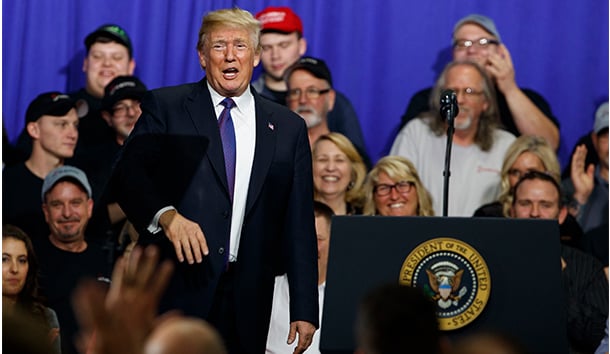The debate regarding President Trump’s sanity is echoed at a slightly less hyperbolic level by liberals’ fervent insistence that he is “not a normal president.” What, exactly, does this mean? That Trump is an “abnormal” president? That he is an “abnormal” man? An “abnormal” human being? Or is their argument simply that he is an unusual one? Again, what is intended here? American presidents have been as unusual as their respective times: Lincoln, Franklin Roosevelt, Obama, and now Trump, all of whom were elected to serve at moments that were either unusual, unprecedented, or critical ones in the nation’s history, or all three. Is “not normal” necessarily a bad thing in a president, or could it be a good one, or a matter of little or no significance at all?
President Donald Trump is certainly unusual in a number of ways. He is not a professional politician. His election to the highest office in the land was an unforeseen political event that confounded the professionals, the hacks, the polls, the so-called pundits, and public expectations. He won it by breaking all the received rules concerning how a successful politician is expected to speak and act, as Beethoven composed great music by deliberately breaking many of the established rules of composition. And, having done so, by remaining true to himself and continuing to follow his instincts he has in his first year been an effective Chief Executive who also has worked to make good on many of his campaign promises. (For this, he might indeed be described as departing from normality. FDR, after all, broke nearly every one of the promises he made in his first presidential campaign in 1932.) Lincoln was elected in the tumult of sectional crisis, Roosevelt in the midst of a financial one, and Obama near the start of a cultural one that, far from resolving or even mitigating, he aggravated considerably, and in doing so made straight the way for Donald Trump.
The United States—more so even than the other Western countries—is suffering through a period unprecedented in her history, and the world’s, for its profound abnormality produced by the hegemony of advanced liberalism, a fantastical, atheistic, morally inverted, and intellectually confused and twisted creed. It is not Trump and his presidency that are abnormal, but their opposition: the Democratic Party, the academy and liberal intellectuals generally, the media, and the professional activist groups. A recent FOX News article quoted a female professor of political science in California’s state university system lecturing her students on the subject of the current occupant of the White House. “Future generations,” she averred, “will wonder how the greatest democracy in the world elected a white supremacist, misogynistic, narcissistic, volatile, belligerent, uninformed, stubborn, failed businessman and orange reality star to the highest office.” Whatever hers is, it is certainly not a normal political-science class.
On the other side, the public is probably more supportive of the President than such people, and many #NeverTrump Republicans, suspect. In a poll taken by NBC immediately following the State of the Union Address, 75 percent of the responders indicated their approval of the speech—the same speech that Democrats and the media described as “divisive.” And there is reason to suspect the accuracy—perhaps even the veracity—of other polls that purport to show Trump’s popularity at 37 percent. This figure, when considered in the context of narrow, more particularized polls showing continued support for the President among his base, the growing popularity of his tax plan, and widespread satisfaction with the strong economy, seems not really credible. The pollsters wildly underestimated his strength before the election, too.
The liberal commentators who persist in describing Donald Trump as “not a normal president” plainly consider the 62,979,879 people who elected him as not-normal voters—perhaps even people—as well. If they’re right, then the total number of “normal” people in the United States (a country of 320 million citizens) who vote is 65,844,954, or the about the total population of the United Kingdom. The commentators who insist on the abnormality of this presidency, and this president, should look within themselves and consider how “normal,” in the context of the long history of the human race, they and their beliefs actually are. “Normal,” after all, is, statistically speaking, an entirely relative term.

Leave a Reply